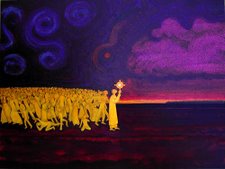
"...There’s a spiritual aspect to the state’s claims. That’s why I call it a “parody of the Church”—it claims to saves us. Currently, it’s saving us from these diabolical terrorists who are out there and want to kill us. The state presents itself as the only protection from this diabolical enemy. The irony is that the state made this enemy for us in the first place.
The amnesia about who terrorists are and where they come from is just amazing. The way the story’s usually told, we were just sitting here minding our own business, and then on September 11, 2001, these crazy people attacked us for no good reason and now we have to defend ourselves. But the truth of the matter is much more complex. It has a lot to do with American foreign policy and American military meddling in the Middle East which we don’t want to talk about. It has a lot to do with the CIA helping to overthrow the democratically elected leader of Iran in 1953 and installing a Shah who ran a brutal dictatorship. These are things we forget, but that other people never forget. The state in a lot of ways is like a protection racket: it defends us against the enemies that it itself creates.
What can or should the Church do if or when the nation state oversteps its boundaries?
"..The first thing the Church needs to do is stop fighting unjust wars. Take the just war theory seriously. I’m not talking about pacifism. If there’s a war that the Church judges is unjust, then Catholics shouldn’t fight it. That’s the way the just war theory is supposed to work. It’s sometimes supposed to say ‘no’ to acts of violence. What the theory is usually used for, of course, is to justify whatever violence is going on. I can’t think of a single instance where it was used to stop violence. That is the most pressing issue.
Imagine what would have happened if Catholics in the previous war had said in significant numbers, “No, sorry, this is an unjust war; we’re just going to sit this one out.” The world would have turned upside down.
Another thing is to stop buying into the idea that all significant questions of money and power need to be funneled through the state, that the only thing we can do about issues like health care is to get the state to do something..."



No comments:
Post a Comment